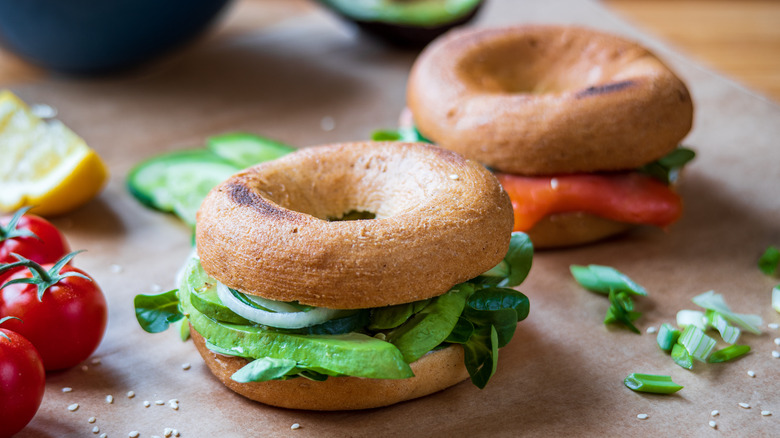What Happens To Your Body When You Eat A Bagel Every Day
Whether you spread them with a dollop of cream cheese or use them to build a tasty sandwich, bagels are the heroes of breakfast. But this carb doesn't have the best reputation in the health industry. Here's what happens when you enjoy a bagel every day.
The biggest issue that health gurus have with bagels is their calorie amount. Bagels are dense, which gives them their signature chewy texture. However, this also means that they pack more calories into a single serving than a slice of bread (via Eat This, Not That!). Bagels sometimes contain three times as many calories as a single slice of bread.
In addition to being high in calories, bagels are typically low in fiber. "Bagels, even wheat bagels, don't have much fiber, and if included regularly in your diet, it may affect your gastrointestinal tract if you aren't getting fiber from other foods, such as beans or lentils," Toby Amidor, MS, RD, CDN, FAND, said. Fiber is necessary to keep you full after eating, so a bagel low in fiber won't keep you satisfied for very long. Eating whole-grain bagels is a good way to enjoy this food while getting some more fiber in your diet.
There are plenty of ways to make bagels more satisfying
Every food can be enjoyed in moderation. If you want a fresh bagel smothered in cream cheese every so often, go for it. However, if you want to eat a bagel every day, there are many ways you can make them more healthy. Instead of eating a regular-sized bagel each morning, opt for a mini one instead. This will let you indulge while keeping your calorie count low (via Health). Making this switch can save you up to 200 calories per day.
Choosing your bagel toppings wisely is also important when enjoying this carb every day. Use non-fat cream cheese or low-fat spreadable cheese instead of a full-fat topping. Toppings that are high in protein, like cottage cheese, peanut butter, hummus, and eggs, are good ways to bulk up your meal. Finally, you can remove the interior of the bagel to save about 100 calories per meal.
You should also keep an eye on the ingredients of your bagels before you buy them. Choose bagels that are low in sodium and added sugar (via Healthline). These ingredients are common in many store bought varieties.


